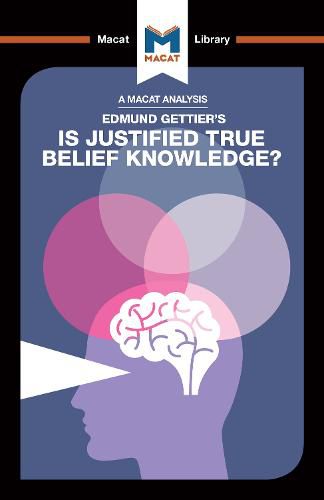Readings Newsletter
Become a Readings Member to make your shopping experience even easier.
Sign in or sign up for free!
You’re not far away from qualifying for FREE standard shipping within Australia
You’ve qualified for FREE standard shipping within Australia
The cart is loading…






For 2,000 years, the standard philosophical model of knowledge was that it could be defined as a justified true belief. According to this way of thinking, we can know, for example, that we are human because [1] we believe ourselves to be human; [2] that belief is justified (others treat us as humans, not as dogs); and [3] the belief is true. This definition, which dates to Plato, was challenged by Edmund Gettier in one of the most influential works of philosophy published in the last century - a three page paper that produced two clear examples of justified true beliefs that could not, in fact, be considered knowledge.
Gettier’s achievement rests on solid foundations provided by his mastery of the critical thinking skill of analysis. By understanding the way in which Plato - and every other epistemologist - had built their arguments, he was able to identify the relationships between the parts, and the assumptions that underpinned then. That precise understanding was what Gettier required to mount a convincing challenge to the theory - one that was bolstered by a reasoning skill that put his counter case pithily, and in a form his colleagues found all but unchallengeable.
$9.00 standard shipping within Australia
FREE standard shipping within Australia for orders over $100.00
Express & International shipping calculated at checkout
For 2,000 years, the standard philosophical model of knowledge was that it could be defined as a justified true belief. According to this way of thinking, we can know, for example, that we are human because [1] we believe ourselves to be human; [2] that belief is justified (others treat us as humans, not as dogs); and [3] the belief is true. This definition, which dates to Plato, was challenged by Edmund Gettier in one of the most influential works of philosophy published in the last century - a three page paper that produced two clear examples of justified true beliefs that could not, in fact, be considered knowledge.
Gettier’s achievement rests on solid foundations provided by his mastery of the critical thinking skill of analysis. By understanding the way in which Plato - and every other epistemologist - had built their arguments, he was able to identify the relationships between the parts, and the assumptions that underpinned then. That precise understanding was what Gettier required to mount a convincing challenge to the theory - one that was bolstered by a reasoning skill that put his counter case pithily, and in a form his colleagues found all but unchallengeable.